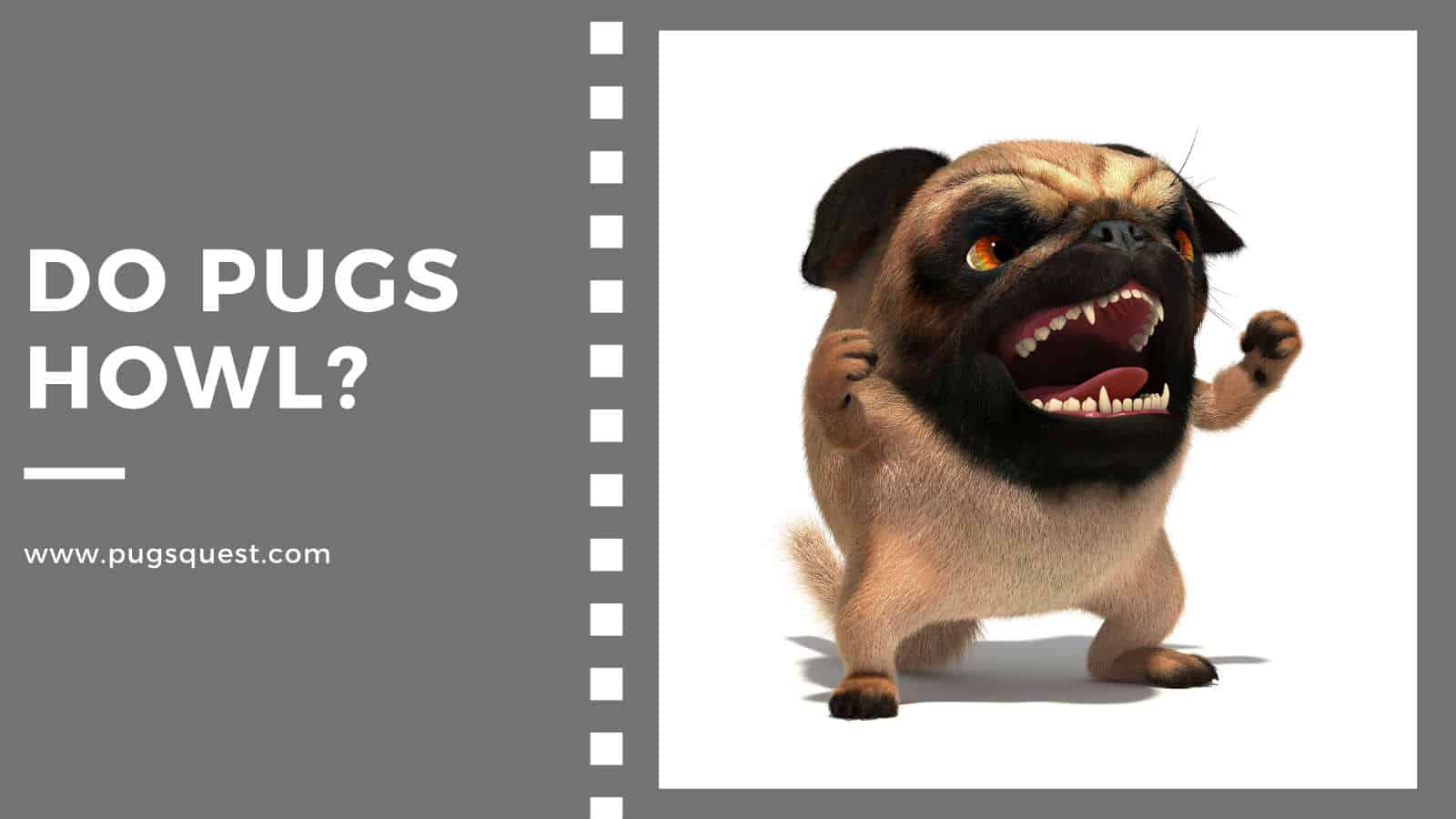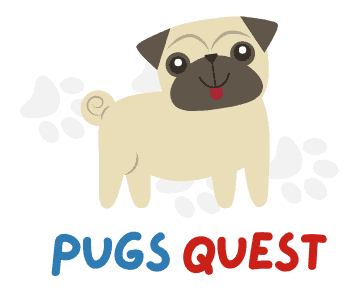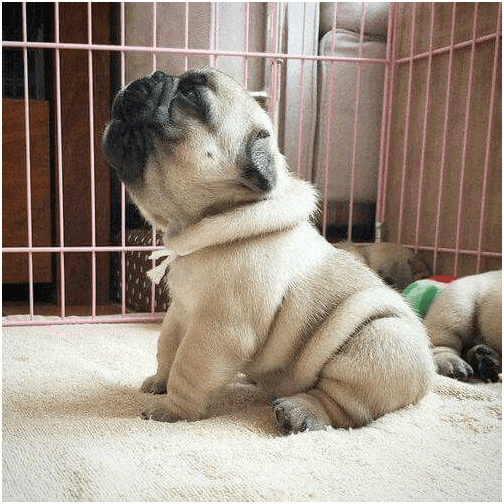
Pugs may be far removed from their wolfy ancestors, but that doesn’t mean they aren’t going to show off their vocal prowess from time to time.
If you’ve been wondering why your Pug likes to howl, hoot, and sing, then you’ve come to the right place. We’re going to be getting to the bottom of this very conundrum.
So, without further ado, why do Pugs howl?
Do Pugs Howl?
Yes. Pugs do howl. Like all dog breeds, Pugs will howl from time to time.
But Pugs are only small. In fact, some Pug parents report that the sound is more like a gentle hoot than anything too wolf-like.
There are many reasons why a dog might howl. For example:
- In response to high pitched noises
- To communicate with other dogs or humans
- Because they are experiencing separation anxiety
- They are feeling territorial (e.g. when your Pug howls at the postman)
- Your Pug is upset by something
- As a way to seek attention
- As a response to pain or illness
In comparison to other, larger, dog breeds, a Pug’s howl is comparatively gentle. But when they’ve started, expect them to go for it.
Check out this video of Bruiser the Pug:
Why Do Pugs Howl?
Many people will tell you that a Pug’s howl is genetically inherited from its wolf-ancestors. In fact, some researchers attribute all domestic canine howling behavior to this root cause.
But a wild-at-heart ancestry is just one reason why your Pug might have a passion for howling.
In reality, there are many different factors that might spark a howling spree.
1. Responding to stimuli
Many dogs (and Pugs included) will howl in response to a sound or situation that triggers this response. Loud and high-pitched noises are the usual culprits.
For example, a siren, fireworks, or even other dogs. Howling is a bit like a row of dominos. Set one dog off and you’ll get the whole canine neighborhood going.
2. Injury or illness
Sometimes dogs that are injured or unwell will howl in response. In such cases, howling is an expression of pain. That pain may be visible (e.g. an external injury) or invisible (e.g. internal pain).
If you suspect that your Pug is howling for one of these reasons it’s important to make an appointment to see your vet immediately.
3. Communication
Howling is sometimes just a dog’s way of communicating with us or other dogs. Think of a wolf-pack howling to each other across the forest.
Howling is a way to send important messages and signals to other pack members.
Just because our pets now live indoors with us, doesn’t mean they’ve lost this instinct.
We may not understand these canine commands, but your pooch doesn’t know that.
4. Attracting attention
We all know how attention crazy Pugs can be. It’s highly likely that your Pug’s vocal antics are just another way to get the spotlight. After all, it works, doesn’t it?
Pugs get bored pretty quickly. Turn your back for just a minute and they’ll be howling for your attention in no time.
And remember, Pugs learn through positive reinforcement. If you paid them lots of attention the last time they howled, chances are they noticed.
5. Excitement
Sometimes you’ve just gotta let out all that pent-up excitement.
If your Pug howls when you give them something delicious, play their favorite game, or hand over a seriously fun toy, then they’re feeling super excited.
Your Pug is showing you their appreciation in an, albeit noisy, way. It’s not too dissimilar to the howl of a hunting dog who just found its prey. Your pooch is feeling happy and accomplished.
6. Irritation
However, excitement isn’t the only emotion that lets out a howl or two. At the opposite end of the spectrum, irritation and anger are also possible causes for your dog’s vocalizations. Pugs are a stubborn lot. Whether sad, annoyed, bored or just a little frustrated, a howl may be triggered.
7. Anxiety
Pugs are prone to separation anxiety. This breed was born for love and attention. And as such, the Pug is most at home cuddled up by its owner’s side.
When a Pug feels nervous, anxious, or alone, it may howl out of distress. This is especially common for people who spend prolonged periods away from the home each day.
In cases like this, it may be necessary to seek the help of a professional animal behaviorist. It’s important to teach your pet that being alone is okay.
It may also help to provide lots of opportunities for mental and physical stimulation whilst you’re out.
8. Marking territory
Last, but not least, howling is also a territorial response.
Many dog breeds (some Pugs as well) fancy themselves as guardians of the home. And they can become quite protective over their boundaries.
If a stranger (usually the postman) encroaches on these boundaries, your Pug will try to assert their dominance in whatever way they can. And howling is often the first response.
How to Stop My Pug From Howling
If your Pug’s howling has become excessive, there are steps you can take to moderate the behavior and teach your Pug that howling isn’t the answer.
1. Desensitization training
Desensitization training is ideal for dogs who typically howl in response to external stimuli (e.g. loud noises).
The idea is to redirect a dog’s emotional response to a particular triggering situation. This way their feeling towards the loud sound changes.
This treatment is often used for animals with severe anxiety or trigger responses.
2. Love and attention
If your Pug is howling for attention regularly, it’s possible that they are feeling a little lonely.
Make sure that you are offering your pet plenty of quality time with you on a regular basis. Pugs need a lot of socialization to feel happy. So get out the toys and get playing.
Top-tip: Try not to reward howling behavior with attention. Wait until the howling has stopped before showering your praises. This will prevent any positive reinforcement of the howling behavior.
3. Teach them a command
Teach your pooch a new command. Teach your Pug the difference between ‘speak’ and ‘be quiet’. That way you have control over your Pug’s howling.
When they obey your command offer plenty of praise and a tasty treat. Repeat regularly and they’ll learn in no time.
4. Professional help
If your Pug’s howling is getting too much to handle, then you may want to contact a certified professional dog trainer or animal behaviorist.
They will be able to get your Pug’s howling under control using the right techniques and strategies for your pup.
Handle Those Pug Howls Like A Pro
More often than not, howling is nothing to worry about.
Your Pug is probably just trying to catch your attention, mark their territory, or simply communicate with their lovely human family.
But sometimes there are underlying physical or behavioral issues at play.
If in any doubt, it’s important to visit your vet. They will be able to conduct the necessary tests to determine the route of your Pug’s howling behaviors.

